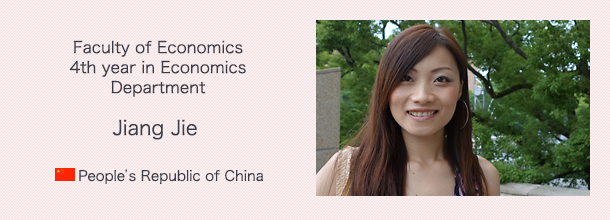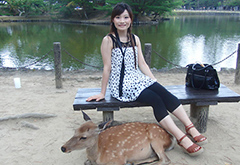

Study at Kansai University
Comments from current international students
Jiang Jie (People's Republic of China)

Your efforts will always bear fruit. I hope to pave my own path in life by believing in myself.
Reasons for choosing Kansai University
I had initially planned on advancing to a university in China after graduating from high school, and I had already passed the entrance exams. But, I started to have questions about going to a university without having any clear vision of what I wanted to do after graduating. And then, I started thinking I wanted to become an interpreter, which was what I wanted to be when I was a child, and entered a Japanese language school in China. The Shandong Province of China, which is where I am from, has many Japanese companies, and my teacher would sometimes take me along as an attendee to the actual frontlines of business. From around then, I started thinking that I would like to study about business in Japan. Later, I began to think seriously about going to study in Japan, and my relatives recommended that I attend university in Osaka. And among the universities in the Kansai region, I chose Kansai University because I was told it is very strong in the field of business.
Difficulties I faced in coming to Japan
About half a year after coming to Japan, I started working part-time at a hotel, because I didn't want to burden my parents financially. But at that time, I couldn't speak or understand Japanese very well, so it was really hard. It also took time for me to accept the differences in the quality of service between China and Japan. I was scolded all the time, and I was irritated with myself for not being able to do the job. But as I started learning the job one by one, I gradually started getting used to things.
About student life
When I look back at my life in Kansai University, I was working so hard every day at preparing for and reviewing my classes, doing my part-time job, and cooking my meals, so that my student life passed by really quickly. In the beginning, I would actively talk to people in class because I wanted to make Japanese friends. Right now, I am the only international student in my research seminar, and I have made many Japanese friends. I've also taken weekend trips.
Kansai University has an especially strong support structure for international students, and offers many different activities. I learned English from a different student at an English class offered by a foreign language conversation exchange program hosted by the Division of International Affairs. I've also participated in this program as a Chinese language teacher. As for financial matters, the school offers scholarships and tuition reduction systems, giving students an environment where they will be recognized for the amount of work they put into their studies. Thankfully, I was able to receive scholarship for three years, and have been able to minimize the time spent in doing part-time work.
About my studies
Right now, I am specializing in business accounting at my research seminar. During my first year, it was difficult to memorize the technical terminologies. But after I acquired basic knowledge, I challenged myself to acquire a 2nd grade level in the Official Business Skills Test in Bookkeeping in order to deepen my understanding of the subject. I was really happy when I finally managed to pass the test at my third attempt. Right now, I am writing my graduation thesis on "noren shokyaku" (amortization of goodwill) which is a practice that is unique to Japan.
About searching for employment
I wanted to find employment in Japan, but I first needed to get used to the Japanese-style job search activities. I was very anxious, because I had less knowledge about Japanese companies compared to the Japanese people. Also, unlike studying, this is not something where you will always be rewarded for the amount of work you put into it. It was very difficult until I received the acceptance letter, but I thought of it as a battle I was fighting against my own self, and kept on advancing, believing in my own potential.
I visited the Career Center almost every day in order to talk about job searching activities, and the staff there gave me their support. For example, the entry sheet is uniquely formatted for Japan, so I think many international students would find it difficult to understanding how to input them. The staff at the Career Center took me by their hands and showed me how to do everything—from how to input into the entry sheet, to how to phrase my words, and how to practice for the interview. For people thinking about working in Japan in the future, I think you will find Kansai University's generous support very reassuring.
After graduating, I have received acceptance to work in a major manufacturer in Japan. I will work hard, hoping to become a business person that is able to work actively at a global level.
Message for students who are hoping to enter Kansai University
Before entering, I was filled with worry, such as whether I would be able to keep up with the classes, and whether I would be able to make friends. There are other international students around me who moan that classes held at Japanese universities are difficult. But, I think that the important thing is your will, no matter what it is that you do. If you are diligent with your studies, such as keeping your non-study enjoyment at a reasonable level, always preparing and reviewing for your classes, and questioning what you don't understand, then I believe that you will always be rewarded for the amount of effort you have put into your studies. I hope you will give your effort and strike out to blaze your own path.
What I enjoyed about my student life
I enjoyed a visit to Nara with my Japanese friend. I was surprised to see so many deer at Nara Park. I also went to Fukuoka with my research seminar group, and have fond memories of having eaten authentic Hakata ramen noodles while we were there.
Note: This interview was held in December 2013.



















